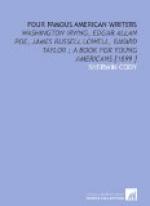At the beginning of the book there are also a number of imaginary notices of “the independent press.” Of course there are no such papers as those mentioned, and the praise and the blame are alike satirical.
In the original volume of “Biglow Papers,” part of a page at the end of these “Notices of the Press” remained unfilled, and the printer asked Lowell if he could not send in something to occupy that space. As poetry came easiest, Lowell wrote a number of stanzas about “Zekle’s Courtin’.” There were only six stanzas in the original edition. Lowell wrote more, but told the printer to break off when the page was filled. This the printer did, and the stanzas which were not put in type were lost, as Lowell had kept no copy. This piece became so popular that friends urged the poet to finish the story, and he wrote a few more stanzas. Then he wrote still others. In the course of time it developed into the long poem printed with the second series of “Biglow Papers,” under the title of “The Courtin’.”
This is the way it runs in the first version; but you will want to read it also in its complete form:
Zekle crep’ up quite unbeknown,
An’ peeked in thru the
winder,
An’ there sot Huldy all alone,
’ith no one nigh to
hender.
He kin’ o’ l’itered
on the mat,
Some doubtfle o’ the
sekle,
His heart kep’ goin’ pitypat,
But hern went pity Zekle.
He stood a spell on one foot fust,
Then stood a spell on tother,
An’ on which one he felt the wust
He could n’t ha’
told ye, nuther.
Sez he, “I’d better call agin;”
Sez she, “Think likely,
Mister;”
The last word pricked him like a pin,
An’—wal,
he up and kist her.
When in the course of the publication of the second series of “Biglow Papers,” twenty years after the first, it was announced that Parson Wilbur was dead, people who had read the first series felt very much as though they had lost a personal friend. The public had learned to love the pedantic, vain old man as if he were a real human being. Lowell had created in him a great character of fiction, almost as if he were a novelist instead of a poet.
CHAPTER IX
A FABLE FOR CRITICS
Lowell’s next attempt in the satirical and humorous line was a long poem written somewhat after the style of the old Latin fable writers, and hence called “A Fable for Critics.” It was written in double rhymes, for the most part, which are very hard to make, and not altogether easy to read; but they help the humorous impression.
This poem was published anonymously, and in it the author hits off all the prominent authors of the day, speaking as the god Apollo. Of course he did not attach his name to it, and as it appeared anonymously he felt that he could say what he liked—in other words, tell the truth about his friends and acquaintances, or at least give his opinion of them. Incidentally, he pokes fun at the literary fads of the day.




